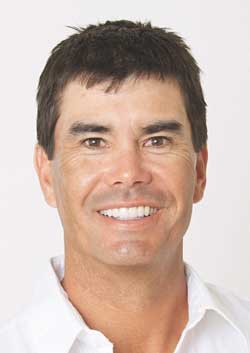Rusty Komori

Rusty Komoroi. Photo from Darryl Watanabe
The end of something often can be sad — a time for reflection and recuperation. But for Punahou School boys varsity tennis coach Rusty Komori, who will retire this year, it also is cause for celebration.
Earlier this month, he and his team accomplished something Komori says no one else in any sport in the country has ever surpassed: 22 consecutive state championships.
“I feel that for someone to hold this national honor from Hawaii is a great thing,” he says. “It kind of shines a spotlight on us coaches, not just in tennis.”
The team’s recent success also highlights a personal milestone for Komori. He began coaching the boys varsity team in 1994 and has been at the helm for each of those 22 wins.
It isn’t just about the achievement of his current team, Komori notes, but of every player throughout the years. “It’s something for them to be very proud of, because my current team, they’re trying to make the players who have come before them proud,” he says.
And much like a true reflection of his coaching style, Komori is quick to point out that the success of his team isn’t solely based on winning. Passing on these values to each player will be, he says, one of the things he’ll miss most.
“I love developing the players’ character through tennis,” he says. “We really focus on our players behaving correctly, thinking correctly — and if they can do that, then playing tennis becomes a lot easier.”
He picked up tennis rather late as a freshman in high school, having played other sports, including baseball and soccer, prior to that.
Though Komori, who appeared on MidWeek’s July 14, 2010, cover, wishes he had started earlier, it wasn’t all for naught. Baseball, for instance, honed his hand-eye coordination, and soccer developed his footwork and movement.
Tennis, though, is where Komori felt he could excel. Because as much as tennis is about belonging to a team, it also is very much about individual skill.
“If you want to be good, it just depends on you,” he says. “No one can tell you that you cannot be good because if you want to be good, it’s all up to you, you can’t blame anybody else.”
His passion for tennis is one that stuck through high school at Damien Memorial, into college at Creighton University and, of course, now, professionally. Along the way, he has learned from and worked with coaches such as Rick Aquino and Bernard Gusman. Each, he says, has developed his own coaching skills in some way.
But really, it’s the students themselves who have given Komori valuable lessons on coaching. “There’s different personalities and everyone learns in different ways, and you can’t treat everyone the same,” he says. “Understanding everyone’s unique personality is very important.”
While Komori’s time at Punahou is reaching an end, his life as a tennis coach certainly is not. He still plans to coach private and group lessons. “Twenty-two years is a long time,” he says of his career at Punahou. “I’m just very proud.”





